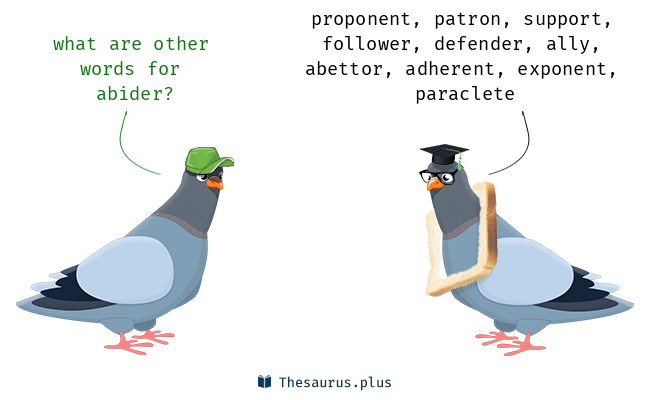
verb (used without object), a·bode or a·bid·ed, a·bid·ing.
- to remain; continue; stay: Abide with me.
- to have one’s abode; dwell; reside: to abide in a small Scottish village.
- to continue in a particular condition, attitude, relationship, etc.; last.
verb (used with object), a·bode or a·bid·ed, a·bid·ing.
- to put up with; tolerate; stand: I can’t abide dishonesty!
- to endure, sustain, or withstand without yielding or submitting: to abide a vigorous onslaught.
- to wait for; await: to abide the coming of the Lord.
- to accept without opposition or question: to abide the verdict of the judges.
- to pay the price or penalty of; suffer for.
Verb Phrases
- abide by,
- to act in accord with.
- to submit to; agree to: to abide by the court’s decision.
- to remain steadfast or faithful to; keep: If you make a promise, abide by it.
verb abides, abiding, abode or abided
- (tr) to tolerate; put up with
- (tr) to accept or submit to; sufferto abide the court’s decision
- (intr foll by by)
- to comply (with)to abide by the decision
- to remain faithful (to)to abide by your promise
- (intr) to remain or continue
- (intr) archaic to dwell
- (tr) archaic to await in expectation
- (tr) archaic to withstand or sustain; endureto abide the onslaught
Old English abidan, gebidan “remain, wait, delay, remain behind,” from ge- completive prefix (denoting onward motion; see a- (1)) + bidan “bide, remain, wait, dwell” (see bide). Originally intransitive (with genitive of the object: we abidon his “we waited for him”); transitive sense emerged in Middle English. Meaning “to put up with” (now usually negative) first recorded 1520s. Related: Abided; abiding. The historical conjugation is abide, abode, abidden, but the modern formation is now generally weak.
In addition to the idioms beginning with abide
- abide by
also see:
- can’t stand (abide)
 Liberal Dictionary English Dictionary
Liberal Dictionary English Dictionary